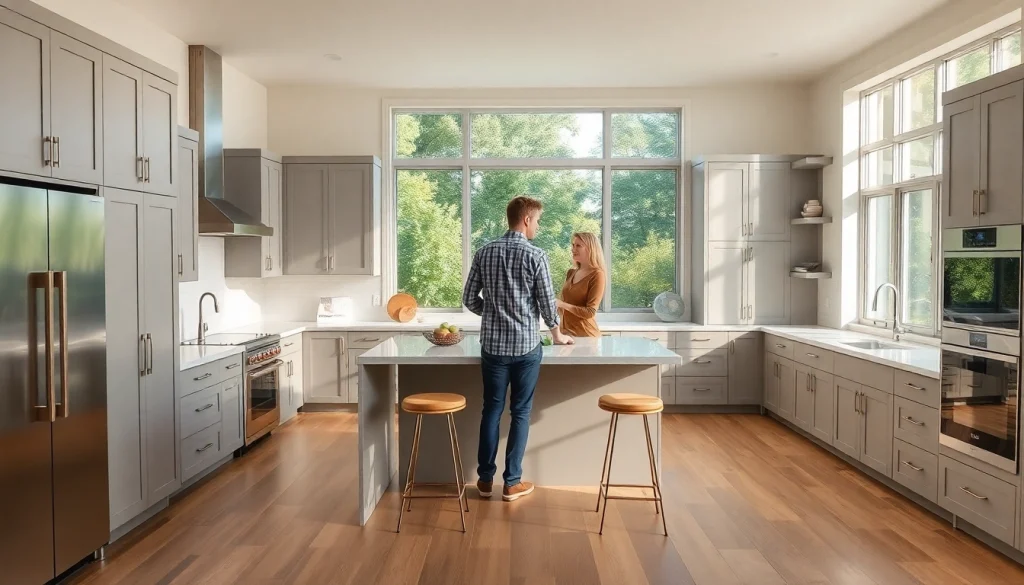
Understanding the Role of a Kitchen Remodeler
A kitchen remodeler is more than just a contractor; they are the craftsmen and visionaries who bring your dream kitchen to life. From conceptualization to final touches, a professional kitchen remodeler manages various aspects of the renovation process, ensuring that every detail aligns with your vision and requirements. As you embark on this journey, it’s essential to recognize what a kitchen remodeler can do for you and understand the unique value they bring to your project.
What Services Do Kitchen Remodelers Offer?
Kitchen remodelers offer a wide range of services tailored to meet your remodeling needs, including:
- Design Consultation: Initial meetings to discuss your vision, layout preferences, and budget constraints.
- Space Planning: Creating functional kitchen layouts that optimize space and improve workflow.
- Material Selection: Assisting in choosing countertops, cabinetry, flooring, and appliances that fit your style and budget.
- Structural Changes: Overseeing any necessary structural adjustments, such as removing or adding walls.
- Project Management: Coordinating subcontractors, managing timelines, and ensuring that the work meets required standards.
Why Hire a Kitchen Remodeler?
Engaging a kitchen remodeler can save you time and reduce stress. Here are some reasons why hiring one is beneficial:
- Expertise: Kitchen remodelers possess the necessary skills and experience to handle complex projects effectively.
- Access to Resources: They have established relationships with suppliers and subcontractors, which can result in better pricing and availability.
- Time Efficiency: A remodeler can streamline the remodeling process, minimizing delays and keeping the project on track.
- Design Knowledge: They understand the latest trends in kitchen design, helping you select features that fit your lifestyle.
Key Qualities of a Professional Kitchen Remodeler
When choosing a kitchen remodeler, look for key qualities that ensure a successful partnership:
- Communication Skills: They should maintain clear and consistent communication throughout the project.
- Attention to Detail: A meticulous approach is critical to achieving high-quality results.
- Problem-Solving Skills: Ability to address challenges as they arise and adapt the plan accordingly.
- References and Portfolio: A reputable remodeler will provide references and showcase previous work to demonstrate their expertise.
Finding the Right Kitchen Remodeler for Your Needs
Researching Local Kitchen Remodelers
Start your search by researching local kitchen remodelers in your area. Look for contractors who specialize in kitchen renovations and have a good reputation. Online platforms like Yelp and Angie’s List can provide valuable insights through customer reviews and ratings. Additionally, consider personal recommendations from friends or family who have had successful kitchen remodels.
Questions to Ask Before Hiring
Once you have a shortlist of potential remodelers, prepare a list of questions to help assess their suitability:
- What is your experience with kitchen remodeling?
- Can you provide references and examples of past projects?
- What is your approach to project management?
- How do you handle unexpected issues or changes in scope?
- What warranty do you offer on your workmanship and materials?
Reading Reviews and Testimonials
Reviews and testimonials are an excellent way to gauge the reputability of a kitchen remodeler. Look for feedback on quality of work, reliability, and customer service. Pay attention to how they respond to negative reviews, as this can provide insight into their commitment to client satisfaction.
Budgeting for Your Kitchen Remodel
Estimating Costs with a Kitchen Remodeler
Establishing a realistic budget is crucial for a successful kitchen remodel. Schedule a financial consultation with your remodeler to estimate costs based on your design preferences and the scope of work. A typical kitchen remodel can vary widely, with average costs ranging from $15,000 to $50,000, depending on the level of renovation.
Cost-saving Tips for Kitchen Remodeling
To maximize your budget, consider the following cost-saving strategies:
- Retain Existing Layout: Keeping the kitchen’s existing layout can save on plumbing and electrical costs.
- Refurbish Rather Than Replace: Refacing cabinets or replacing hardware can provide a fresh look without the cost of new cabinetry.
- Shop Sales: Take advantage of seasonal sales on appliances or materials to save additional costs.
- DIY Selected Tasks: If you’re comfortable, consider taking on simpler duties, such as painting or installing backsplash tile.
Understanding Payment Structures
Discuss the payment structure upfront with your kitchen remodeler. Common payment arrangements include upfront deposits followed by milestone payments as the work progresses. Ensure you have a clear agreement regarding when and how payments will be made to ensure transparency throughout the project.
Planning Your Dream Kitchen with a Remodeler
Designing Functional Kitchen Layouts
Work closely with your remodeler to design a kitchen layout that meets your needs and lifestyle. Consider the kitchen work triangle, which includes the sink, stove, and refrigerator, to optimize efficiency. Additionally, think about how you use your kitchen daily—whether for cooking, entertaining, or family gatherings—and design accordingly.
Choosing Materials and Finishes
Choosing the right materials and finishes can significantly impact the aesthetics and functionality of your kitchen. Options range from granite countertops to laminate, hardwood flooring to tile, and modern fixtures to vintage elements. Prioritize quality and durability while keeping your overall style in mind.
The Importance of Lighting in Kitchen Design
Effective lighting is essential for both functionality and ambiance in the kitchen. Incorporate a mix of task, ambient, and accent lighting to ensure a well-lit space. Consider under-cabinet lighting for prep areas, pendant lights over islands, and chandeliers or recessed lighting to create warmth and style.
Measuring Success of Your Kitchen Remodel
Key Performance Indicators for Kitchen Projects
To measure the success of your kitchen remodel, establish Key Performance Indicators (KPIs) from the outset. These may include:
- Sticking to the budget
- Meeting the project timelines
- Achieving desired functionality and aesthetics
- Receiving positive feedback from family and friends
Post-remodel Satisfaction Surveys
Once your remodel is complete, consider conducting a satisfaction survey to evaluate your experience. This can be done informally or through structured feedback. Questions may focus on various aspects of the remodel process, such as communication, quality of workmanship, and overall satisfaction.
Celebrating Your Newly Remodeled Kitchen
Finally, don’t forget to celebrate your new kitchen! Host a gathering with friends and family to showcase your newly remodeled space and enjoy the fruits of your labor. A well-designed kitchen should not only be functional but also serve as a welcoming space for shared memories and delicious meals.






